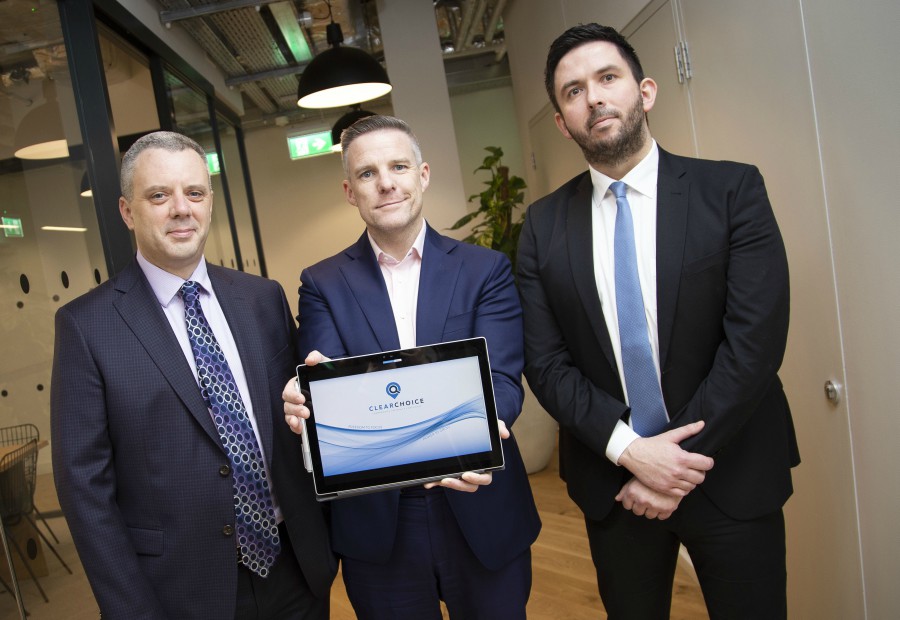By failing to include colleagues with autism and other neurodiversities, employers are missing out on a loyal and dedicated source of talent. myAccessHub is on a mission to fix that.
According to myAccessHub founder Gearoid Kearney, an estimated 85pc of degree-level graduates in the US with autism are unemployed.
This, he argues, is a symptom of a lack of understanding of the needs and potential of employees with autism and other neurodiversities.
“We don’t need to create jobs for individuals with autism, the jobs are already here. We just need to think about their environment and ask them what they want”
Founded by IT Tralee graduate Kearney (pictured above), myAccessHub helps businesses and employees learn to be more inclusive of colleagues with autism and other neurodiversities. The company’s technology uses e-learning and virtual reality to immerse employees in scenarios that educate them in how small things within their workplace can have a huge impact on employees who have autism and other neurodiversities.
“It’s about using technology to enable companies to build autism inclusive workplaces. This means educating employees within the companies to understand what it’s like for an individual with autism in your workplace, and how you can actually make it better for them. That means reducing the physical barriers, like lighting and office layouts and sounds, but also basic communication and understanding the things that make it difficult for them in the workplace.”
Seeing through different eyes
myAccessHub works with major multinationals in Ireland such as MSD in Cork as well as start-ups and SMEs throughout the regions. This involves both online and onsite workshops.
“There’s a virtual reality element to it, where they put on the headsets and experience the challenges such as fluorescent lighting.”
Kearney studies computer science at IT Tralee and operates from the Tom Crean Business Centre at Kerry Technology Park in Tralee.
“I had a lot of friends and colleagues who had no problem getting through their degree courses, but when they were getting to interview situations then they couldn’t get jobs. And I’m hearing more and more of the last two years whereby there are huge barriers for individuals with autism entering the workplace. And then, if they’re lucky enough to get into the workplace, they find a very hard to stay within the jobs because the built environment is suited to neurotypical individuals and is not built around people that are neurodiverse.
“We need to start focusing companies on the need to make the environment suitable for everyone. And not just suitable for neurotypicals. And not trying to get neurodiverse individuals to change their behaviour to suit your typical environment.”
After attending the New Frontiers programme at the Tom Crean Centre, Kearney got to work developing MyAccessHub’s business model.
“The reality with this is it’s an international business, and it’s never going to be restricted just to Ireland. And the companies we work with have an international footprint. But being able to base myself out of Kerry, being from Kerry is very important to me, and seeing the likes of the big companies that have based themselves here but have a huge international footprint like Aspen Grove Solution and Fexco are an inspiration to me.”
Developing the company’s technology in-house, building a platform on the cloud using platforms like Amazon Web Services and leveraging supports from Enterprise Ireland, Kearney has built myAccessHub into a scalable platform. Making astute use of social media platforms like LinkedIn and Twitter, he has succeeded in building a customer base that includes multinationals based in Ireland like Trend Micro in Cork.
“When people say that digital marketing Twitter is dead. It’s not. And LinkedIn is another tool that so many businesses are underutilising as a selling tool that I connect with some amazing people to get the message out there.
“It’s about really educating and raising the awareness.”
Embrace diversity in all its forms
While most companies have been dealing with diversity from a gender perspective, embracing neurodiversity has by and large taken a back seat in their considerations.
“It’s just not a priority for businesses, but that will change.
“The biggest piece around this is disclosure for the individuals. The reality is if you have dyslexia, dyspraxia, ADHD or autism, you don’t feel comfortable enough to disclose to your employer and there’s still a societal fear or stigma around it that if you disclose to a colleague. The greatest problem that I want to solve through myAccessHub is to build workplaces where people are comfortable to disclose and not be in fear of being judged or having their career impacted.”
Another danger is that people tend to pigeon-hole people; for example, assuming that people with autism are only good at technology.
“I have friends who are autistic and they’re actually running start-ups and they’re developing and selling product.
“It has been estimated that 35pc of entrepreneurs in the US are dyslexic.
“We just need to break down the barriers and just create an environment that’s nice, because that’s the way we all want to work.
“The talent is there. But I’m hearing it every day of the week whereby they just they can’t stay in the job. So, when a leader turns around and says, well, there’s a career there’s a shortage when it comes to talent in this country in computing. The talent is there but we’re actually just leaving them outside.”
Kearney cited the example of a senior manager who is leaving Ireland to go to the UK because, despite years of working with her company, after disclosing to her employer that she had autism she was referred to an external psychologist.
“Our reaction to autism in this country is alarming. ‘I don’t know how to deal with it. We’re just not going to think about it.’
“In the States, they reckon 85pc of graduates with autism are unemployed. Now these are the graduates with degrees. You have the individuals that are fully qualified for the roles, but they are not being given a chance.”
Opportunities to harness remote or flexible working should also be presented as an option and an opportunity for future workplaces.
“A girl I know with autism wanted to work from home and she would still do the day’s work on the Wednesday at home. She believed that if she could have that one day, it would make the whole week bearable and she could stay within the company. They straight-off refused.
“Another example is a senior manager at a pharmaceutical company managing a lot of staff. And she has autism, had disclosed that and she works from home five days a week. And she says that if that opportunity wasn’t there for her, she would not be with that company.
“It’s a simple, reasonable combination, where she said, there’s no office environment that is really that suitable unless you really rip out the lights and change from open plan. But allowing her to work from home was key.”
The typical issues workers with autism encounter include hotdesking, bright lights and noisy environments.
“Ask the question, it shouldn’t be a fear thing. It should be what can I do to help you – do you have an issue with fluorescent lighting, do you hear a buzz? I often believe that the small companies have the greatest opportunity to benefit from this in terms of loyalty. You want to hire someone that’s going to stay with you for a good couple years. And the reality with autism is and anyone that’s neuro diverse, it’s a loyalty thing whereby if they’re happy in an environment, they’re not going to be as easily swayed by just an increase in wages.
“Flexibility doesn’t just have to be remote working, it could be allowing people to come in at different times of the day. Or it could be something as simple as investing in noise-cancelling headphones.”
In conclusion, Kearney cited research from JP Morgan that found that workers with autism tend to be 92pc more productive and 48pc faster on tasks.
“We don’t need to create jobs for individuals with autism, the jobs are already here. We just need to think about their environment and ask them what they want.”
Written by John Kennedy (john.kennedy3@boi.com)
Published: 2 December, 2019






